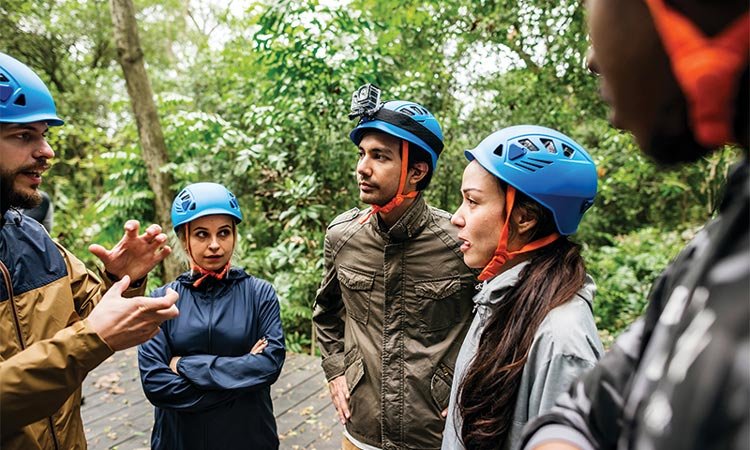I boarded the plane that would take me home from a visit to Toronto, Canada. A gentleman came and sat in the seat beside me, talking on his iPhone. I recognized his South African accent, having attended a conference there the previous year.
Soon enough, Andrew and I were engaged in a lively conversation that lasted for the rest of the flight. He had a lot of stories to tell, and I mostly listened. I discovered he had experience in outdoor adventure team-building. For several years, his job had involved taking teams of coworkers, often executives, on adventurous outings into the South African bush—an experience that would, quite literally, stress them to their limits.
Andrew grinned as he told me in detail about the various dilemmas, puzzles, and challenges he would set up for these office-dwellers in the great outdoors. As they encountered situations where they were physically challenged, emotionally tested, and downright scared, they would start to become different people—people who had gained new perspectives and understood things about themselves and their coworkers that they hadn’t seen or understood before. When they returned home, most of them would get back to work with significant issues resolved.
That sounded to me like a fascinating prospect—to learn new things about myself and my coworkers by testing my limits. I also thought about how engaging it must have been to be in his position—not just for the sheer adventure of being in interesting and exciting places, but for the opportunity to see others experience epiphanies and transformations.
It’s not every day that I get to talk to someone like Andrew, and I figured I could get some excellent tips and advice based on his years of experience in working with people from such an interesting angle.
“In all your years of team-building,” I asked, “what would you say has been the most common issue or problem that needed to be resolved among these groups of people?”
“Communication. The issue has nearly always been communication.”
“Because people who work together don’t talk to each other enough?”
“They talk plenty! What hardly anyone does enough of is listen.”
That was an Aha! moment for me. It sounded familiar enough, although I know I’m not nearly as good at listening as I should be. I said earlier that I mostly listened during our conversation, but that was because I really wanted to hear Andrew’s stories. In other circumstances, though, I don’t think I can say as much for myself.
Andrew went on to share how communication isn’t communication unless people understand one another. More often than not, people think they’ve communicated because they’ve said what they felt needed to be said, or have written what they felt needed to be written, but in reality, they don’t have a clue whether or not the other person understood them. Very often, the other person will have gotten a completely different idea than what the communicator intended.
To find out if you’ve communicated effectively or have understood what someone else was communicating, ask questions and—you guessed it—listen!
Not long ago I listened to a talk by Peter Kreeft, “One Thing Needed,” that built on my newfound listening lesson. He wisely stated, “Not many people can be great speakers. We can all be great listeners.” I think that sometimes I try too hard to be a good speaker, and forget that the majority of the time that’s simply not what people want or need.
Kreeft also said, “When we listen to each other, that’s rare, that’s special. Something always happens when we listen.” I do have a few recollections of times when I discovered something amazing by the simple act of shutting up and listening. Unfortunately, they are relatively few. I could have had so many more.
I don’t know that a lifelong resolution to listen more is realistic, but I am now trying to focus on finding people to listen to. Why would I want to limit myself to what’s in my own mind when I can gain insights from many minds—including, notably, God’s mind.
Something else just came to me about the beauty of listening: There are times in our lives—and now is one such time in mine—when we don’t feel we have a whole lot to give. We’re struggling, maybe we even feel a little lost. We want to help others, but what can we say that’s sure to help? Well, maybe there are situations when there isn’t anything we can say that would help. But everyone wants to be listened to and understood. If I can lend a listening ear, I’ll always have something valuable to give. Most likely, that will be more appreciated than whatever I could say anyway.
